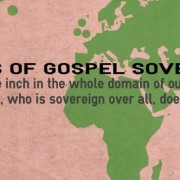Dear reader: the following article was impressive to me, so I decided to pass it on to you. I hope your love for and trust in the Lord increases as you read; that’s the effect it’s had on me. ~ Bill Holdridge
A Few Thoughts on Calvinism
By Pastor Doug Hileman
First Christian Church of Marysville, CA
In the churches I have attended through the years, Calvinism has been viewed with suspicion and even scorned (“Once saved, always saved.”) Consequently I have never been exposed to more than a brief mention of the subjects of election and predestination in sermons or Bible studies conducted in a non-Calvinistic setting. As these two doctrines are major recurring themes in the New Testament, I view their virtual dismissal by those of my persuasion as misguided censorship. I suppose this should come as no surprise—once you have developed a loyalty to a doctrinal point of view you tend to lose a measure of objectivity—viewing any “opposing” texts or concepts through the filter of your own settled convictions. This tendency cuts both ways, of course. Calvinists exhibit their own reluctance toward thoughtfully considering the other point of view; I think it is fair to say that within their ranks their own conclusions are rarely examined with fresh eyes.
My intention in writing these thoughts out is mostly to help me sort through my own frustration with the knee-jerk responses associated with this area of study. Obviously, I do not write from a neutral position— I strongly disagree with Calvinistic teaching. However, I have had good fellowship with a number of Calvinists, and have accepted that we will probably have to agree to disagree. And so in my musings here, I really only intend to pursue a single question—why would an interpretation of scripture that seems to me to be so unreasonable have such a strong appeal to people who seem to be at least as reasonable as I am?
To begin, I consider the probability that there are motivations on both sides of the issue in addition to simple love of the truth. From an insider’s point of view, it’s fairly easy to understand the lack of enthusiasm for Calvinism which is held by most non-Calvinists, as well as virtually all non-believers. Calvin’s view of predestination is a maddening thing to consider: A view that says that in spite of the soul’s desire to be at peace with God, and to enter into a relationship with Him; no matter how willing one might be to fulfill whatever conditions are required of them to draw near to God and believe the gospel and thereby receive mercy; unless they are the object of a divine election that has no reference whatever to anything they might say, do, or believe, they are lost— without remedy, hopelessly and eternally. Such teaching is acknowledged by Calvinists to be—“hard”. James Black, a Calvinistic pastor from a previous generation authored a book that is a classic on the subject of preaching. But along with some wonderful insights regarding the art of creating and delivering sermons, the book also provides some valuable insight into the mental workings of a faithful Calvinist. I will have occasion to quote from Rev. Black a couple of times in these notes, first of all regarding the hardness of Calvinistic doctrine.
“Our Scottish Calvinism may have been a hard, unbending, even logically cruel thing: but what gave the Calvinistic church its unfailing dignity and power was its prostrating sense of awe—wonder at the decrees and sovereignty of God and wonder at His unmerited mercy.” (The Mystery of Preaching, pg. 130)
Again, I can easily understand why the average non-Calvinist shrinks back in apprehension from Calvin’s view of predestination, but I remain mystified by the behavior on the other side of the aisle: what is it that compels Calvinists to embrace such a “logically cruel” notion, and reject out of hand the idea of full access to a salvation offered freely to all men? Aside from their obvious answer—“That’s what the Bible teaches” (an answer I would contest)—I am inclined to look further than that.
Certainly there is an appeal to being one of the chosen ones, the “in” crowd so to speak. But that does not seem to be the motivation behind the attraction, for Calvinists seem to be as humble regarding their own lackings as they are suitably awed by the glory of God. No, I feel the issue is more fundamental than that. Lately, as strange as it might sound, I have begun to wonder if the awe-stricken worship referred to so often by Calvinists might be where the “hard and unbending” nature of this system has its roots. I have heard and read professions of fear and awe from Calvinists many times before. It is striking how much more frequently that type of sentiment is expressed in Calvinistic writings when compared with the works of others. I had always assumed such statements were the spontaneous, personal expression of their reverence for God, and thought I would do well to learn from their example. But through the years as I have read more of their material, I have begun to wonder if this is an acquired sensitivity, perceived to be obligatory; not an affectation, but something along the lines of a theological tradition or culture, passed down from one generation to the next. This mindset of fear and awe is not improper, of course—far from it. But along with the teaching in Scripture to relate to God in that particular way, there are other biblical examples of individuals who had a degree of relaxed familiarity with God; not from presumption or disrespect, but of an “Abba Father” nature. The “Calvinistic Awe” that James Black refers to smacks more of Sinai than of Zion. The Israelites— including Moses himself— were certainly shaken by fear and awe of God at Sinai. But that is not the pattern which we have been given to follow in this present age. (Hebrews 12:18-24) The view of God at the foot of Sinai contrasts dramatically with the perspective gained on the slopes of Zion. And needless to say, so do the covenants they represent.
Consider the concept of God for a moment—what is God like? Christian thinking in the first several centuries after the Apostolic Age leans very heavily on Greek philosophy, especially in regards to the nature of God in His perfection. The view of God held by virtually all Christian leaders at that time mirrored the Platonic one. As a perfect being, God was untouched by emotion, passion, or change. Based on this assumption, one view of Christ developed as having a “compartmentalized” dual nature, because His divine nature would by definition be incapable of suffering. With this non-Biblical model of divine nature at the headwaters, the understanding of everything downstream became subject to a nagging, polluting influence, which causes confusion to this day.
So what if, in a parallel fashion, Calvin embraced a narrow view of God; while ostensibly based on the Scriptures, it is a view that is inconsistent with the full revelation of God as recorded in the narrative of Scripture. For the picture he draws of God in the exercise of sovereign election seems to be one of unfeeling intellect—His is a merciful intelligence to be sure—but of a cold and detached sort. For in Calvin’s estimation, all that really matters is God’s sovereignty expressed through His decrees. The eternal bliss or misery of humanity are not really considered for their own sake, and are viewed only as a means to an end—to glorify God. Now, when examined as individual components, each of the aforementioned concepts would be considered orthodox to most Christians. There is nothing of higher value than the glory of God, His sovereign will is the ultimate good, both heaven and hell will be used to demonstrate His glory, etc. But something is missing in the overall picture when we view these particular teachings in isolation from the narrative of scripture: the revelation that the Bible gives us of the personality of God. Calvin attempts to give something of the machinery but nothing of the heart; and Calvinism has a very mechanistic feel to it. Could it be that, having embraced a one-dimensional view of God as the whole, (in terms of election and predestination, at least) Calvin’s theology in all its “hard, unbending, cruel logic” is the inevitable outgrowth what seems to me to be theological tunnel vision?
There is much to be said regarding what might be termed “the reasonableness of God” in the Bible. That emphasis seems to be entirely absent from the Calvinistic perspective. God demonstrates this side of His nature rather frequently in His dealings with men, and appears to respond to their perceptions of justice, explaining Himself and even reasoning with them on occasion. Some examples:
- Cain, and his appeal that his punishment was too hard to bear. (Gen. 4:13-15)
- Abraham, and his attempt to bargain for the lives of the righteous in Sodom and Gomorrah. (Gen.18:20-33)
- Moses, interceding for Israel when God wanted to destroy them and start over. (Ex. 32:9-13) (This case is especially notable, as God exclaims to Moses at one point in the conversation, “Leave Me alone!”)
- Jonah, pouting about God not destroying Nineveh, and God gently reasoning with him so he would see His perspective on the matter. (Jonah 4:9-11)
- And in the New Testament—The Gentile woman who came to Jesus and asked for deliverance for her demon possessed child. Initially Jesus refused, but she won Him over with her reasoning. (Matt. 15:22-28)
- Throughout scripture, God is revealed as possessing a willingness to talk things over and reason things out. He makes a distinct offer through Isaiah along these lines. (Is. 1:18)
My point is this: much of the “hardness” in Calvinism seems to emanate from the unswerving reliance on the teaching in Romans 9 alone to absolutely define the nature of predestination and election, without reference to other passages of scripture. This is where Paul is defending God’s right to make one person a vessel of mercy and another a vessel of destruction—any way He sees fit, no questions asked. (Or no reasoning allowed, if you will.) And so the conclusion is drawn that everyone’s eternal destiny is determined on that basis alone. Now pause for a moment and consider that there are several examples of biblical teaching that initially appear to be contradictory to other scriptures. When two such views seem to be at odds with each other, we generally look for the balance between them. As an example, the doctrine of the Trinity when viewed alongside the submission of the Son to the Father. Or the view of justification by faith in Romans in conjunction with the same doctrine in James. I submit that Romans 9 taken alone will give an imbalanced view of the workings of predestination and election. Let me quote once again from James Black as he instructs his students on the function of isolation in preaching:
“In this connection may I add—do not be afraid of exaggeration. Isolation of any kind is exaggeration: and when you isolate a text or subject from the whole coherent body of truth, you exaggerate it in the very process. State your main truth, in the distinct and even limited aspect you have chosen, and trust to the correcting influence of your whole ministry. There is nothing so futile as aiming at a foolish completeness.” (The Mystery of Preaching, pg. 51)
In a nutshell, he says that examining one aspect of a doctrine in isolation may give a false impression of sorts (imbalance or over-emphasis), but you can and should supply the balance over the course of your ministry. He says it is often quite impossible to give the whole picture within the framework of one solitary sermon. This wonderful advice for preaching the Bible seems to be overlooked by Calvinists when it comes to interpreting it. Rather than look for a balance between the teaching in Romans 9 and other portions of scripture that strongly indicate man’s free will and a universal opportunity to come to Christ, it seems to me that Calvinists firmly shut the door of further inquiry with these familiar words—“ But indeed, O man, who are you to reply against God? ” (Rom. 9:20) In doing so, they believe they contend for the faith, and take a firm stand in defense of God’s sovereignty and glory. But I contend that Calvin taught a view of God that is not wholly biblical. As a result he unwittingly ended up with a duality of his own—the God of love revealed to us in the Person of Christ, and the God of ancient mysterious “wisdom”, that predestined some to glory, and the rest to damnation. This second side of God is not talked about openly, especially to non-believers. It is a thought too terrible to consider at length. Martin Luther alluded to it, but did not like to ponder it himself. The Calvinists will never state the doctrine of election in all its stark reality to a congregation. They will focus on hope. On the “lighter side” of God, if you will. But in the background, under the surface, in the darker corridors of theological imagination lurks this image of an inscrutable and severe Intelligence in eternity past who determined to cast millions and millions of humans into hell—why?— because it made sense to Him.
Calvinism has an overarching design to it—to “protect” the doctrine of God’s glory and sovereignty. The urgency and zeal which Calvinists exhibit for this mission remind me of the man named Uzzah who lived in David’s day. (II Sam. 6:1-19) The Ark of the Covenant was being transported on an oxcart on one occasion, when the cart hit a pothole and the Ark began to tip. With the best of intentions, Uzzah reached up to steady it, and was struck dead instantly. David “was afraid of God” that day, and immediately put a safe distance between himself and the Ark. He later discovered through a study of the scriptures the reason for this God’s behavior—the Ark was being transported contrary to the pattern given by Moses, who taught that it was never to be touched by any man who was not a Levite. Using the oxcart to transport the ark seemed logical enough, but it was a mimicry of the unbiblical method adopted by the Philistines when they returned the Ark to Israel just prior to this incident.
David’s fear on this occasion was based on what David perceived as unpredictable behavior on God’s part. It is also significant that David was, “…angry because of the Lord’s outbreak against Uzzah.” I don’t think it is stretching things to say that at that moment David thought God was unreasonable, and anger is a very logical reaction to unreasonableness. However, once David understood and practiced the teaching of scripture (I Chron. 15:1-15), God wasn’t so scary after all. He understood God’s actions and intentions and felt safe enough to draw near again. David began to worship with tremendous joy, and God’s presence at last came to rest in Zion. One of the many lessons contained in this account is this: every time the church relies on the wisdom of the world to interact with God, it causes problems—in particular, problems with man’s perception of God. It seems to me that most of the difficulties Calvinists have with their interpretation of predestination and election have more to do with logic than with scripture. They pose questions like, “If God doesn’t control all this absolutely, how can He really be considered sovereign?” Or, “How could Christ die for someone and that person still end up lost? Wouldn’t that mean His death was in vain? Wouldn’t that mean that the purposes of God are subject to the will of man?” Nevertheless, the Scripture seems pretty clear on these two points; that God has given man a free will, and Christ died for the sins of the whole world. Logic notwithstanding.
Having shackled themselves with presuppositions that have no mandate in Scripture, Calvinists have embraced a system of theology that is neat, tidy, marvelously logical, and paradoxically, quite unreasonable. They have fallen prey to the same temptation as the early Church Fathers—leading with logic rather than scripture. As a consequence, they have ended up with a similar dilemma. I must conclude that when Calvinism is embraced there is an unavoidable tendency to compartmentalize God. He is eternally loving toward us, and eternally not towards the non-elect. The contemplation of God’s love for the elect is cherished and gratefully viewed from every conceivable angle by Calvinists, as it should be. His supposed lack of love for the non-elect, however, is stated flatly, and then for all intents and purposes, promptly ignored. This is understandable, because if Calvinistic theology is pursued relentlessly to its logical conclusion, the serious hindrances posed are inescapable (despite the denials of its adherents). Calvinism produces a sense of hopelessness in potential converts; while seeking to defend the doctrine of God’s sovereignty, it holds forth a twisted, monstrous view of His heart toward mankind. Christian workers are affected as well, for the good news of the gospel has been replaced with a formula that is fatalistic, logically reducing the efforts of the church for the evangelization of the world to little more than posturing. All that work is to be done, it seems, to glorify God through obedience, but not really for any actual effect on the eternal destiny of others. Here is the bottom line: if any effort of individual believers or the church can be said to the slightest degree to have any bearing whatever on the outcome in an individual’s response to God, then the whole system of thought erected to protect the sovereignty of God comes crashing down. It seems to me therefore that to be a Calvinist one is forced to live in a “pretend” world. You must pretend that your efforts actually make a difference, and you must pretend (at least in front of others) that everybody has a chance to be saved. The whole system is so unnecessary, and so unnecessarily complicated, that I wonder why it has gained as much acceptance as it has. No doubt the attraction is “the security of the believer.” But that is a topic for another time.












